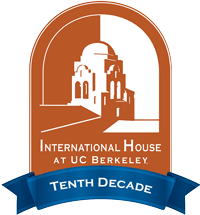88% of Students at Berkeley I-House Feel Safe Expressing Views, Defying National Free Speech Trend on College Campuses
Contrary to data from universities across the US, students at Berkeley International House say their environment fosters open dialog and protects free speech
BERKELEY, Calif., December 4, 2024 – International House Berkeley (I-House Berkeley), the multicultural residential center promoting a more just and peaceful world, today announced the results of a comprehensive resident survey focused on free speech in the college environment. Contrary to recent, widely published research from the Knights Foundation and the Foundation for Individual Rights and Expression (FIRE) and CollegePulse, I-House Berkeley students expressed positive sentiments about freedom of speech, with 88% saying they feel safe to share their views within the I-House environment.
The majority of I-House students—94%—say they feel comfortable sharing controversial opinions with fellow residents, while 83% say they are comfortable expressing those viewpoints to other UC Berkeley students and 82% are comfortable having discussions with their professors. This is in stark contrast to university students nationwide, who reported low levels of comfort in expressing their views to their peers on campus or to their professors.
“Following a spate of research about the abysmal treatment of free speech on college campuses, we thought it important to gauge the comfort of I-House students in engaging in open dialogues and sharing controversial points of view,” said Shaun Carver, executive director of I-House Berkeley. “We were pleased but not surprised by our findings. For nearly 100 years, the I-House model has proven successful in bridging significant chasms, demonstrating that it is possible to not only be civil to one another but to respect and understand other points of view, even if you disagree. Fostering an environment where individuals feel safe to express their opinions is critical to building bridges. We need to see more of that on college campuses across the US and the world.”
I-House Berkeley students are an anomaly among their peers at the University of California, Berkeley, ranked among the worst college campuses in the US for freedom of speech in the FIRE survey. Only 42% of UC Berkeley students believe university leaders prioritize free speech, as opposed to 91% of I-House respondents who say they are confident in I-House leaders’ protection of free speech. Sixty-two percent of I-House residents say I-House does more to protect freedom of speech and expression than UC Berkeley.
I-House residents also expressed strong opinions about separating free speech from hateful or harmful speech and were widely opposed to disruptive protest actions. Nearly 80% of respondents disagreed with shouting down speakers, 92% were against blocking other students from attending events, and 97% opposed using violence as a means to protest. These findings reflect a general preference for respectful civil discourse over obstructive or aggressive methods.
I-House residents showed resilience in overcoming discomfort with sharing ideas, with 64% saying they will speak up even when they feel uneasy. Over half say they have discussed controversial topics more frequently since becoming I-House residents. Sixty percent of respondents did admit to self-censoring in other learning environments on campus, suggesting that the I-House model is more conducive to open dialogue.
“Our students today face a highly polarized environment where the loudest voice often ‘wins,’” Carver continued. “But that mindset does little to foster progress or to encourage broad thinking and more effective problem solving. Protecting free speech while respecting others is possible. We’ve demonstrated how to do so within our ecosystem, and we have nearly a century of experience that proves its working. I’m encouraged that 85% of our residents expressed confidence about the future of free speech at I-House, and we plan to continue in that tradition.”
The survey was conducted in November 2024 and included responses from over 104 residents, nearly 20% of the total population who currently reside at I-House Berkeley.
About International House Berkeley
The International House at UC Berkeley is a multicultural residential “living and learning” center of nearly 600 students and scholars from 70+ countries, including the U.S. Its mission is to foster intercultural respect and understanding, lifelong friendships, and leadership skills for a more just and peaceful world.
Founded in 1930 with a charitable gift from John D. Rockefeller Jr., I-House is a non-profit organization with a remarkable history, and is part of a network of International Houses Worldwide. For more information, please visit its website
Media contact
International House at UC Berkeley







